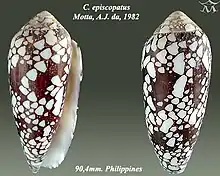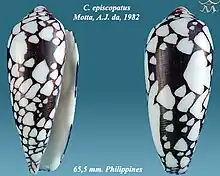| Conus episcopatus | |
|---|---|
 | |
| Apertural and abapertural views of shell of Conus episcopatus Motta, A.J. da, 1982 | |
| Scientific classification | |
| Domain: | Eukaryota |
| Kingdom: | Animalia |
| Phylum: | Mollusca |
| Class: | Gastropoda |
| Subclass: | Caenogastropoda |
| Order: | Neogastropoda |
| Superfamily: | Conoidea |
| Family: | Conidae |
| Genus: | Conus |
| Species: | C. episcopatus |
| Binomial name | |
| Conus episcopatus Da Motta, 1982 | |
| Synonyms[1] | |
| |
Conus episcopatus common name the dignified cone, is a species of sea snail, a marine gastropod mollusk in the family Conidae, the cone snails and their allies.[1]
Like all species within the genus Conus, these snails are predatory and venomous. They are capable of "stinging" humans, therefore live ones should be handled
Description
The size of the shell varies between 40 mm and 115 mm. The shell of Conus Episcopatus is elongated and has a high spire, which means that it has a tall apex. The shell is relatively thick and heavy, with a glossy surface and a series of raised ridges or ribs that run along its length. The overall shape of the shell is conical, with a pointed apex and a wider base.
The coloration of the shell can vary widely, but it basically has a base color of white or cream, with a series of darker or lighter bands, blotches, or spots that form complex patterns. The patterns can be quite intricate and unique, which is one reason why cone snails are prized by collectors.
Like all cone snails, Conus Episcopatus is venomous and uses its venom to immobilize and kill its prey. Venom is delivered through a harpoon-like structure called a radula tooth located on the proboscis of the snail. The venom of some species of cone snail can be highly toxic and dangerous to humans, and care must be taken when handling them.
Conus episcopatus is found in tropical and subtropical waters of the western Atlantic Ocean from the Gulf of Mexico to the Caribbean Sea. It lives in coral reefs and other shallow marine environments, where it feeds on other small marine invertebrates such as worms, molluscs and crustaceans.
Distribution
This marine species occurs in the tropical Indo-West Pacific, off the Mascarenes; off India; off Australia (Queensland).

References
- 1 2 Conus episcopatus Da Motta, 1982. Retrieved through: World Register of Marine Species on 27 March 2010.
- Dautzenberg, P. 1937. Gastéropodes marins. 3-Famille Conidae'; Résultats Scientifiques du Voyage aux Indes Orientales Néerlandaises de LL. AA. RR. Le Prince et la Princesse Lé Belgique. Mémoires du Musée Royal d'Histoire Naturelle de Belgique 2(18): 284 pp, 3 pls
- Fenaux 1942. Nouvelles espèces du genre Conus. Bulletin de l'Institut Océanographique Monaco 814: 1–4
- da Motta, A. J. 1982a. Seventeen new cone shell names (Gastropoda: Conidae). Publicações Ocasionais da Sociedade Portuguesa de Malacologia 1:1–20, 17 figs. page(s): 1–2
- da Motta, A.J. 1982. An examination of the Cone textile complex, part VI. La Conchiglia 14(158–159): 20–21
- Lauer, J. 1989. Conus magnificus macilentus, nomen novum. Publicaçoes Ocasionais da Sociedade Portuguesa de Malacologia 14: 17–23
- Wilson, B. 1994. Australian Marine Shells. Prosobranch Gastropods. Kallaroo, WA : Odyssey Publishing Vol. 2 370 pp.
- Röckel, D., Korn, W. & Kohn, A.J. 1995. Manual of the Living Conidae. Volume 1: Indo-Pacific Region. Wiesbaden : Hemmen 517 pp.
- Puillandre N., Duda T.F., Meyer C., Olivera B.M. & Bouchet P. (2015). One, four or 100 genera? A new classification of the cone snails. Journal of Molluscan Studies. 81: 1–23
External links
- The Conus Biodiversity website
- Cone Shells – Knights of the Sea
- "Darioconus episcopatus". Gastropods.com. Retrieved 15 January 2019.
Gallery
 Conus episcopatus Motta, A.J. da, 1982
Conus episcopatus Motta, A.J. da, 1982 Conus episcopatus Motta, A.J. da, 1982
Conus episcopatus Motta, A.J. da, 1982 Conus episcopatus Motta, A.J. da, 1982
Conus episcopatus Motta, A.J. da, 1982 Conus episcopatus Motta, A.J. da, 1982
Conus episcopatus Motta, A.J. da, 1982